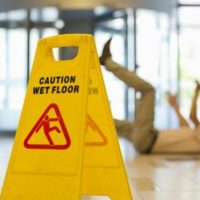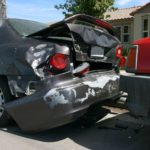Do I Have a Slip and Fall Case?
Everyone who has been to a store, be it a retail store, department store, grocery store, etc., can probably identify the many potential slip and fall hazards that exist within the store. Indeed, from slippery floors to spills of food and products, to loose wires or debris in walkways to crowds of people that make navigating a store dangerous (Black Friday snafus are common), the potential for a slip and fall accident is obvious.
What may be less discernible, however, is who is liable for injuries should a customer experience a slip and fall. Here’s a look into California premises liability and negligence law, and what you need to know if you have been injured in a store slip and fall accident.
Who’s Liable for a Slip and Fall?
There are many parties who are often involved in a slip and fall accident that could be held partially or fully liable for an accident. These parties include:
- The injured party;
- A store employee;
- Another customer;
- The store (as a business); or
- A third party, such as the manufacturer of a product that caused the slip and fall or a contractor who was hired to repair a dangerous condition, but failed to do so.
Liability is based on which party acted negligently, or breached their duty of care.
Duty of Care in Slip and Fall Accidents
The owner of the store where the slip and fall occurred has a legal duty to maintain the property in a reasonably safe condition, and to repair/remedy any known hazards within a reasonable amount of time. If this duty is breached, and an injury results, the injured party can bring forth a claim against the property owner for damages. To bring forth a successful claim, the injured party must prove that: 1) a hazardous condition existed, 2) the store knew or should have known of the condition, 3) the store failed to remedy the condition, and 4) the condition was the proximate cause of injury.
A store may also be held liable for the actions of their employee when the actions occurred during the course of employment. For example, if an employee failed to clean up a spill because they were preoccupied with stocking shelves, ultimately leading to a customer’s slip and fall accident and injuries, the individual employee will not be held individually liable; instead, because the employee was acting within the scope of employment, the store will assume liability. If the employee was doing something outside of the scope of employment, such as operating a forklift while intoxicated and while not technically “on the job,” and this is what caused the accident, then the individual employee may face legal action.
The theory of comparative negligence must also be considered. This theory holds that liability is proportionate to fault, and that a plaintiff’s damages will be reduced in proportion to their own degree of fault. Consider the example above about a slip and fall caused by a spill that wasn’t cleaned. If a review of the evidence shows that the plaintiff was running in the store at the time of accident, which a normal person would probably consider unsafe and unreasonable to do, then it may be decided that the store was 80 percent at fault, and the plaintiff was 20 percent at fault. As such, the plaintiff would only be able to recover 80 percent of their total damages amount from the defendant (store). This theory applies to all parties involved in the accident and claim; each party is responsible for their portion of fault.
Help Determining Liability after a Slip and Fall Accident
Slip and fall accidents can be scary, and sometimes, they can result in severe injuries which may be permanent and even life changing. If you have been injured in a slip and fall accident that occurred within a store, it is important that an investigation into your accident is opened immediately. To recover compensation for harm you have suffered, liability must be established and proved.
At the law offices of Garmo & Garmo, Attorneys at Law, LLP, our California slip and fall lawyers are prepared to help you. We have the resources to thoroughly investigate your claim, and the skill set to identify the liable party and demand damages. To learn more about how we can help, please tell us more about your case using our online form, visit our law office in person, or call us for a free consultation at 619-441-2500.




